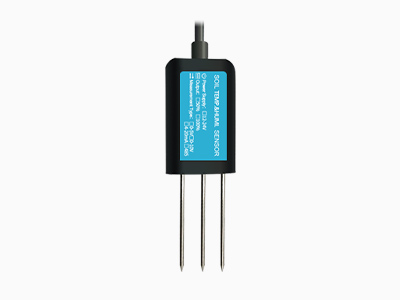Soil moisture probe become a powerful tool for precision agriculture. Maintaining optimal soil moisture levels is vital for successful crop production and efficient water management in agriculture. Overwatering or underwatering can result in yield reduction, nutrient leaching, and increased water usage. This article explores the significance of soil moisture probes and their applications, highlighting the benefits they bring to farmers and the environment.

Understanding Soil Moisture Probe:
Soil moisture probes, also known as soil moisture sensors or meters, are electronic devices designed to measure the water content in the soil. They provide real-time data on soil moisture levels at different depths, allowing farmers to make informed decisions regarding irrigation scheduling and water conservation. By monitoring soil moisture, farmers can maximize crop yields, optimize nutrient uptake, and minimize water wastage.
How Do Soil Moisture Probes Work?
Soil moisture probe utilize various technologies to measure soil moisture accurately. The most common types include:

a. Capacitance Probes: These probes use electrical capacitance to determine soil moisture levels. They emit an electrical pulse into the soil and measure the change in capacitance caused by the presence of water. Capacitance probes offer high accuracy and are suitable for a wide range of soil types.
b. Tensiometers: Tensiometers measure soil moisture tension or the force exerted by roots to extract water from the soil. They consist of a vacuum gauge connected to a porous ceramic tip inserted into the soil. As soil moisture decreases, the tension increases, and this change is displayed on the gauge. Tensiometers are ideal for monitoring water availability in the root zone.
c. Time Domain Reflectometry (TDR) Probes: TDR probes work based on the reflection of electromagnetic waves sent through the soil. They measure the time it takes for the wave to travel through the soil and back. The moisture content affects the speed of the wave, allowing for accurate measurements. TDR probes are reliable and suitable for various soil types.
Benefits and Applications of Soil Moisture Probe:
a. Improved Irrigation Efficiency:
By providing real-time data on soil moisture levels, probes enable farmers to implement precise irrigation scheduling. This reduces water waste, lowers energy costs, and promotes sustainable water management practices.
b. Enhanced Crop Yield and Quality:
Maintaining optimal soil moisture levels throughout the growing season is crucial for maximizing crop yield and quality. Soil moisture probes ensure that crops receive adequate water when needed, preventing stress conditions and promoting vigorous growth.
c. Nutrient Management:
Proper soil moisture levels facilitate efficient nutrient uptake by plants. By monitoring soil moisture, farmers can adjust their nutrient application strategies, ensuring that plants have access to essential minerals for optimal growth and development.

d. Disease Prevention:
Excessive soil moisture can lead to the development of fungal diseases. Soil moisture probes help farmers avoid overwatering, preventing the onset of these diseases and reducing the need for chemical treatments.
e. Environmental Conservation:
By accurately measuring soil moisture, farmers can minimize water usage, reducing the strain on local water resources. This contributes to sustainable agriculture practices and protects the environment.
Integration with Precision Agriculture Technologies:
Soil moisture probe can be integrated into precision agriculture systems, enhancing data-driven decision-making. By combining soil moisture data with other parameters such as weather conditions, crop growth stage, and historical data, farmers can create precise irrigation plans tailored to specific field conditions. Integrating soil moisture probes with automated irrigation systems further optimizes water efficiency and reduces manual labor requirements.
Conclusion:
As precision agriculture continues to evolve, integrating soil moisture probes into advanced systems will further enhance the sustainability and productivity of farming practices. By harnessing the power of soil moisture probes, farmers can embrace precision agriculture and pave the way for a more efficient and environmentally conscious future.
